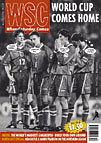 Steve Lilley explains how a lack of financial expertise brought about Millwall's collapse
Steve Lilley explains how a lack of financial expertise brought about Millwall's collapse
The announcement on 21st January that Millwall Holdings plc had sought an administrative order came as a surprise to no one who had been following the club's ailing fortunes.
That Millwall should have been forced to take such drastic action is due to a combination of admirable ambition and poor financial management. In October 1989 with the club riding high in the Old Division One chairman Reg Burr and his board took the ground breaking step of floating Millwall Holdings plc. An il-fated venture into pub management decimated the market valuation of the company and for several years before suspension the shares hovered around the 4p mark against a par of 20p. Interestingly, the flotation mmonies were to be used to develop non-playing activities but not for the new ground, which began to be built in 1992.
It was the scale of the move away from The Den which underpins the issues which Millwall face today. Controversy still regins between supporters and directors about the level of consulation which took place, but Reg and the boys went for it by building a £20 million all-purpose arena, in the New London Stadium. Big events would bring big profits to be spent on the soon-to-be Premiership force in South East London, the whole process expertly managed by US company Ogdens, experts in running huge sporting arenas across the Atlantic. Millwall quickly found out that New Cross is not New York and the alliance ended in tears and empty legal threats; poor communications, infrastructure and image were all factors in the failure to attracts events – as Manchester has discovered, it is impossible to out-Wembley Wembley.
The £3 million manning costs of the New Den had to be covered by the sale of players and so Colin Cooper, Kenny Cunningham and Mark Kennedy among others slipped quietly out of the door.
It was now obvious that Millwall's brave new world was going to be football-only, but equally it became critical that the club achieved promotion from Division One in order to support the Premiership infrastructure it had created for itself. If this had been the original strategy, ground-buildingcosts and running expenses would have been dramatically reduced.
Enter the technical wizard Mick McCarthy, whose strategy of putting every new signing on top dollar and long contracts put the club under further financial strain. The lack of a Finance Director – unheard of for a public limited company – meant that there was no-one to rein in his excesses. By the end of 1995-96 Millwall had a playing staff of over 40 and a wage bill of £4.1 million. Compare this to the end of 1987-88 which ended in the Lions' first ever promotion to the top flight where 33 players earned £826,000. Even allowing for inflation, the financial control was non-existent. McCarthy might be blamed for poor judgement, but any manager was going to take advantage of such lassitude.
Relegation last season was the final nail in the coffin, with losses in excess of £3 million covered by the sale of Keller, Rae and Thatcher. But the cupboard was bare and Chairman Peter Mead decided that protection from creditors (Raith Rovers, Lewisham Council and the Inland Revenue) was necessary in order that financial reconstruction could be launched.
The lessons are obvious – directors are willing to gamble everything to get into the Premiership and, in puruit of the dream, lose touch with reality. The fact that Millwall isn't the principal reason for their current plight, but it should serve as a reminder to willing investors that in football the business fundamentals just do not stand up to scrutiny. Injuries, referees, poor transfer decisions – all will ultimately affect an investment.
Millwall's story, of ill-judged but understandable ambition allied to poor financial control and even poorer luck, will become typical. Let's leave the final words to Reg Burr who masterminded the new ground and McCarthy's early spending sprees: "The club has been ambitious but ambition has to be tempered with logic. Maybe that will happen now." Hindsight, they say, is the greatest sight known to man.
From WSC 121 March 1997. What was happening this month